
Source: ChessBase News
The ACP-ChessBase questionnaire – preliminary results 06.03.2009 – Three weeks ago the Association of Chess Professionals (ACP) and ChessBase sent out a poll to top chess players. Their answers kept coming in, with more expected soon. Full results will be presented soon. However, we have decided to send the following preliminary results to the FIDE Presidential Board, which is meeting in Istanbul from the 6-8th of March 2009. Figures and opinions.
 The ACP-ChessBase questionnaire – preliminary results
The ACP-ChessBase questionnaire – preliminary results
By Olena Boytsun, ACP Board Member
On the 13th of February 2009 the Association of Chess Professionals (ACP) and ChessBase announced a poll they were conducting among top chess players. The preliminary results of the poll have been prepared for the attention of the FIDE Presidential Board, whose meeting is taking place in Istanbul on the 6-8th of March 2009. A more detailed report with a deep analysis of the poll results as well as players’ suggestions will be published in the course of this month.
The ACP Board had intended to present the poll results as well as some proposals for the improvement of chess management to the FIDE Presidential Board through the participation of an ACP Board representative in Istanbul. However, FIDE officials warned the ACP Board in writing that active participation in the FIDE PB was only possible under special circumstances. With regret the ACP Board decided not to send a representative to Istanbul to try to take part in the PB meeting. Therefore the following results are provided in written form.
The main aim of the ACP-ChessBase questionnaire was to understand the opinion of top chess players on the most important issues of their professional life. The poll was conducted by email in order to make sure that the answers genuinely came from the players surveyed. Criteria of participation were as follows: players with a rating 2690 or higher (on the January 2009 FIDE list), plus participants of the current cycle, plus some ex-world champions.
The following poll statistics are provided as of 05.03.2009. Poll results have been audited by the ACP Board and representatives of ChessBase simultaneously and independently, in order to assure the correctness of the results.
Despite the time frame (13.02.2009 – 05.03.2009) that was full of chess events, in which most of the chess professionals took part in, 22 players reacted to the questionnaire. 21 (twenty one) respondents sent back the questionnaire with their answers and suggestions. One (one) potential respondent declined in writing the proposition to participate in the poll.
Therefore, the preliminary poll results are based on the answers of 21 top grandmasters.
The questionnaire by itself can be found on ChessBase.com or the ACP web site.
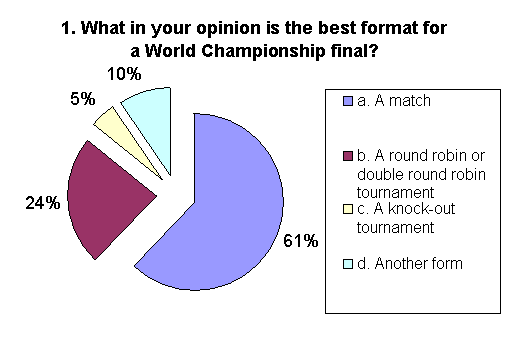
13 respondents (61%) stated that the match is the best format for a World Championship final, while 5 grandmasters (24%) prefer a round robin or double round robin tournaments. 1 player believes that World Championship final should be a knock-out tournament. The respondents also shared their ideas, how the World Championship cycle should be organized. This will be published in the final report.
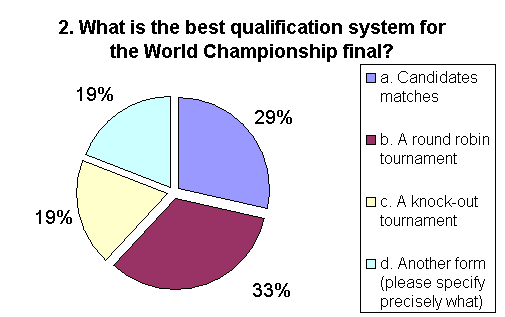
There is no clear result on what could be the best qualification system for the World Championship final. The majority of respondents (7 people, 33%) think that a round robin tournament is the best option. 6 players (29%) would prefer candidates matches. One should point out that during the evaluation of the answers to Question 2, if a player choose more than one variant and didn’t prefer A, B or C precisely, his answer was marked as D, and his opinion will be provided in a more detailed report. The answer D in most cases contains the variant of a round robin tournament with another supplement event.
Question 3 and Question 4 are about time controls that the respondents think are appropriate for World Championship and chess tournaments in general. 12 respondents (60%) think that the so called “Classical” time control is the most suitable for the World Championship. 1 respondent considered the rapid time control as the most efficient one.
However, unlike the World Championship time control, only 28% (6 people) think that the “classical” time control should be implemented in chess events in general. 10 grandmasters (47%) preferred the FIDE time control. 2 respondents didn’t clearly answer the question, specifying that all controls are possible for chess events. Therefore this answer option was added to the question.
90% of respondents (19 people) think that there should be a time increment starting from move 1. None is against any form of time increment. One respondent thinks that there should be an increment from move 40 and one player provided his opinion on the interdependence of time increment and time control.
The majority (13) of respondents (62%) agreed that “Decent dress” should be made obligatory during World Championship and top tournaments. 5 people pointed out that suit and tie should be obligatory. None was against any dress code.
Only 1 respondent believes that doping controls should be obligatory and comply with the regulations of the IOC. 8 people (38%) don’t see a necessity for doping controls, but would accept them, while other 8 players would accept doping controls if they are adapted specifically for chess. 4 respondents are against any doping controls in chess.
67% of respondents believe that the anti-computer cheating controls should be obligatory and made as tough as possible. 3 respondents (14%) don’t see a necessity in cheating controls, but would accept them. One respondent didn’t give a precise answer to the question and pointed out that a special study on the subject of anti-computer cheating controls should be provided.
Only one respondent believes that the player should automatically forfeit the game, if he is late for a game. 33% of players believe that either a financial or rating penalty should be the punishment for being late; another 33% (7 people) specified other options of punishment. 29% preferred not to have any penalty for being late for a game.
67% of respondents (14 people) believe that the current rating system is fine and there is no need for changes, while 33% suggested some changes in the rating system.
Since the question is important for the FIDE Presidential Board decisions, the more detailed overview is given to the Question 11.
47% of respondents clearly objected to any changes made to the current cycle. Some respondents already expressed their position and objected in public. For example, GM Boris Gelfand fully supported the views of GM Levon Aronian that the later expressed in his open letter (http://www.chessbase.com/newsdetail.asp?newsid=5059), published on the 6th of December 2008.
The opinion of GM Maxime Vachier-Lagrave is the following: "A WCC cycle should keep on until its end. Changes during a cycle are basically unfair for its participants, as it may change their conditions to qualify for the final of the WCC. Only in case a WCC cycle may collapse some changes may happen, but only after all the participants of the current cycle and FIDE have a meeting to decide exactly which changes."
GM Ernesto Inarkiev: “I believe that if we are going to have a long cycle with big sporting privileges for the Champion, than the question about changes will be raise all the time. Strong players who left the cycle will not want to go through a long qualification events in order to finally play the Champion, who can be on the same level as them. As a result, it will lead to lobbying for changes in the cycle. Not to make changes in the cycle in this case means to exclude a real challenger from the cycle for a long period of time, as well as the to refuse financial inflows. At the same time, the constant implementation of changes will not allow to build a normal stable system for the World Championship cycle. In my opinion, both variants are bad, and one has to choose the lesser of two evils.”
"Полагаю, что пока у нас будет длинный цикл с большими спортивными привилегиями для Чемпиона, то вопрос об изменениях будет возникать постоянно. Сильные игроки, выбывшие из цикла, не будут хотеть проходить длительный отбор, чтобы затем сыграть с Чемпионом, который по уровню игры вполне сопоставим с ними. В результате, будут лоббироваться изменения в цикле. Не вносить изменения в цикл в этом случае означает выключить реального претендента из борьбы на длительный срок, и отказ от финансовых вливаний, а постоянное внесение изменений не позволит создать нормальную стабильную систему розыгрыша первенства мира. На мой взгляд, оба варианта плохи, и приходится выбирать меньшее из зол."
29% of respondents (6 grandmasters) provided their view on the abrupt changes to the current cycle, having chose an open “other” option, therefore their answers are cited below.
GM Alexei Shirov pointed out that “changes are needed because the Grand Prix is on its way to collapsing”. GM Shirov suggested the optimal system of the World Championship cycle, which will be provided in detail in the final report to follow.
GM Rustam Kasimdzhanov expressed his opinion as the following: “I find any changes made during the cycle generally wrong; but in order to make any judgments upon a current situation one would have to see the whole picture (link to financial crisis , for instance) , and I do not think I have any sufficient knowledge to do so at the moment.“
GM Vladimir Kramnik beleived that: “I think that the new system, which includes candidates tournament, is a better one, because it serves the main goal of a qualification, which is to define the strongest challenger for the title. But, of course, it should have been done before the beginning of the cycle. In general ,the whole plan of the WC cycle must be well thought out in advance.”
GM Vugar Gashimov stressed that: “There should be only one format of WCC for a long time - not change it every year”.
GM Etienne Bacrot pointed out that: “The current system is way too complicated anyway, so that changes may be generally welcome. But of course, FIDE should never have changed rules during the cycle, as they did in Dresden.”
GM Michael Adams expressed the following opinion: “It is never acceptable to make changes to a cycle in progress. In recent times, the formats have also been changed extremely regularly which is also not very desirable. The best way to resolve the situation is to come up with a fixed format which can be used for several cycles. I am opposed to privileges and seedings for players in general and would either avoid these completely or keep them to an absolute minimum (only for the World Champion).”
5 players would accept the changes to the current cycle, if they lead to increasing of the overall prize fund of the cycle.
12 players are comfortable with the condition to play the tournament in a soundproof glass cabin in a public square. One grandmaster rejected the idea, while 19% are uncomfortable with the idea, but would accept it, if it benefits chess. The answer variant “Other” was added to the answer options, since 4 respondents gave their extended view on the question.
The ACP and ChessBase thank all the respondents for their participation and hope that this first project will be a perfect base for future improvement and increased efficiency of the chess management system. A more detailed report on the ACP-ChessBase questionnaire with a deeper analysis of the poll results will be published on the website of the partners during the month of March 2009.
05.03.2009
2009 © the Association of Chess Professionals | www.chess-players.org
2009 © ChessBase GmbH | www.chessbase.com
For any questions concerning the ACP-Chessbase questionnaire, please, don’t hesitate to contact Olena Boytsun at strategical.development@gmail.com.

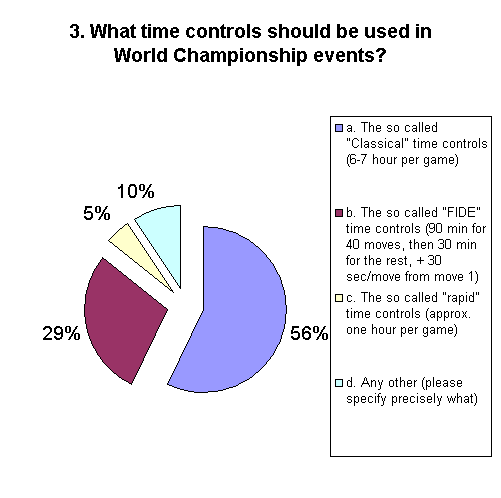
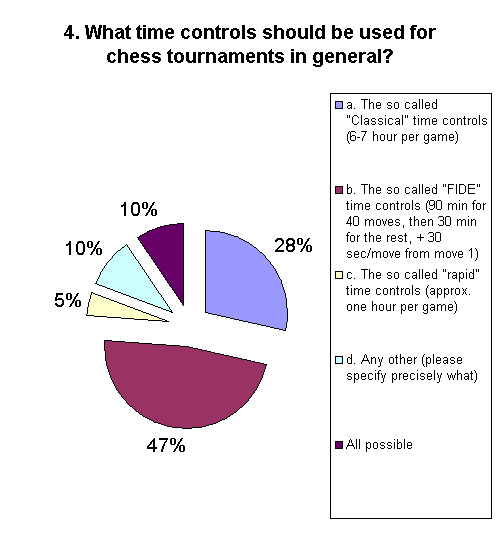
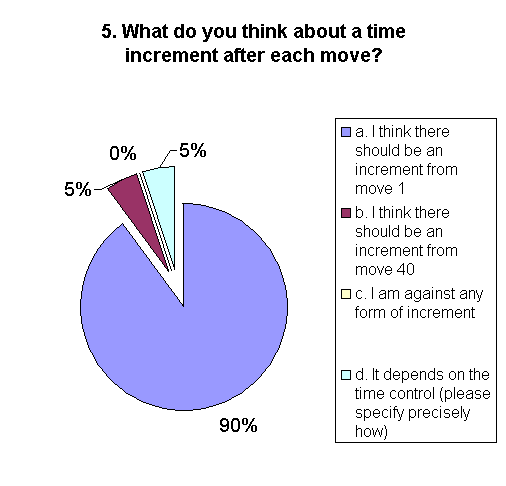
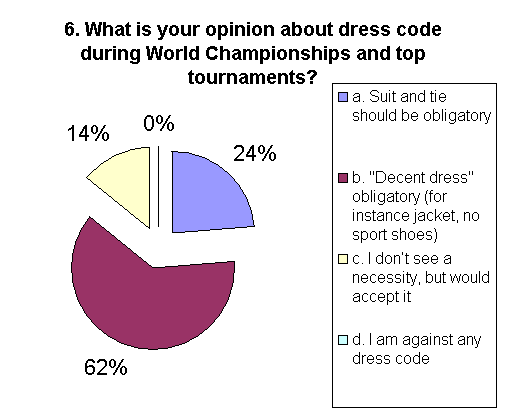
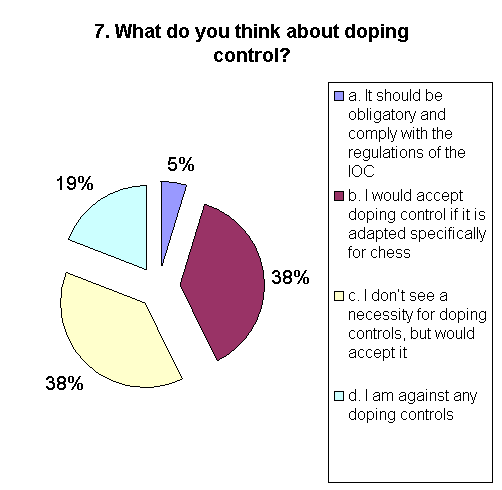
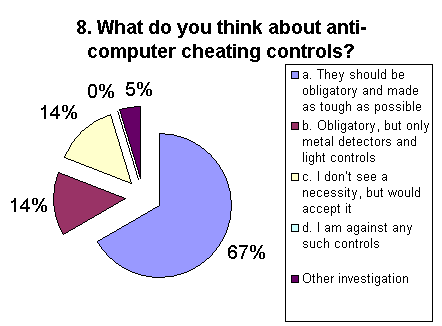
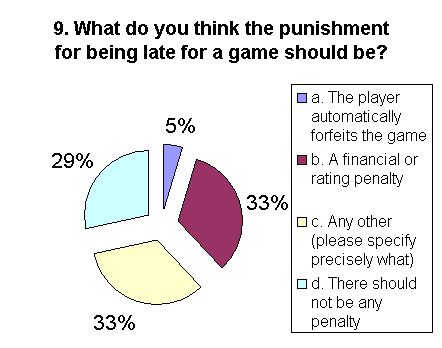
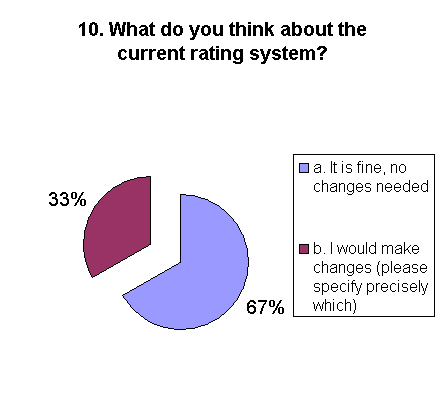
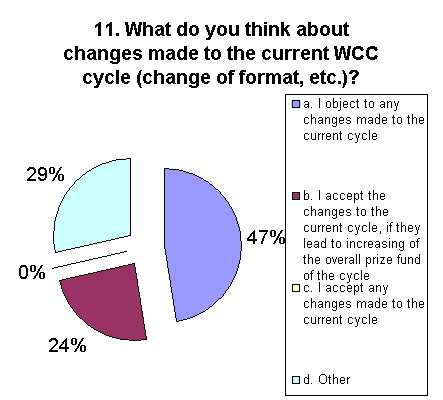
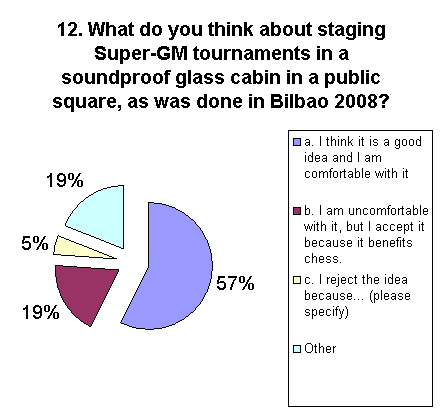

No hay comentarios:
Publicar un comentario